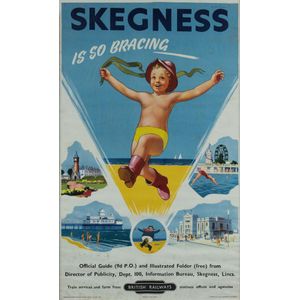Skegness: Bracing Beaches and Local Landmarks
This site contains only a limited number of works of art sold in Australia and New Zealand, and is not representative of the art market for any artist. For a comprehensive art database visit our specialist site, Australian Art Sales Digest which includes over 400,000 works auctioned in Australia and New Zealand by over 30,000 artists, covering the period from the early 1970s to the present day.
Original British Railways travel poster 'Skegness is so Bracing', circa 1959 poster by Wilfred Moody Fryer (1891-1967). Featuring a young child skipping along a beach surrounded by local landmark vignettes from this Lincolnshire seaside town. Printed by Stafford & Co. Ltd., Netherfield, Nottingham. Good condition, with some foxing and display soiling. 99 x 60 cm
You must be a subscriber, and be logged in to view price and dealer details.
Subscribe Now to view actual auction price for this item
When you subscribe, you have the option of setting the currency in which to display prices to $Au, $US, $NZ or Stg.
This item has been sold, and the description, image and price are for reference purposes only.
- Foxing - Foxing is a type of discoloration or staining that occurs on the edges or pages of old books, manuscripts, and other paper-based materials. The term "foxing" comes from the reddish-brown color of the stains, which is similar to the color of fox fur.
Foxing is caused by a variety of factors, including exposure to moisture, high humidity, and oxidation. Over time, these environmental factors can cause the paper to yellow and develop the distinctive brownish stains. The discoloration can also be caused by pollutants in the air, such as smoke and chemicals, or by the presence of certain types of mould or mildew.
Foxing can have a significant impact on the value and appearance of old books and manuscripts, and is often considered a defect. However, some people consider foxing to be a sign of the history and aging of the paper, and view it as a desirable characteristic. - Circa - A Latin term meaning 'about', often used in the antique trade to give an approximate date for the piece, usually considered to be five years on either side of the circa year. Thus, circa 1900 means the piece was made about 1900, probably between 1895 and 1905. The expression is sometimes abbreviated to c.1900.
This item has been included into following indexes:
